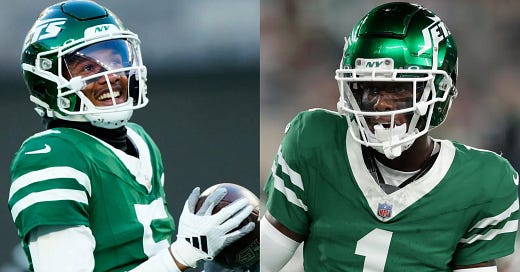Jets Shouldn’t Let Extension Talks Linger Too Long
The Jets are under no obligation to extend the contracts for their precious 2022 Draft class, particularly wide receiver Garrett Wilson and cornerback Sauce Gardner. Both players are tied to New York for the next two years under the terms of their rookie deals, and then the Jets can franchise tag one of them in advance of the 2027 offseason. Though they will be relatively underpaid on a massive scale this season, Wilson and Gardner, as non-quarterbacks, aren’t typically entitled to such special treatment.
The Jets should give it to them anyway, for football AND financial reasons.
Waiting has rarely benefited the team when it comes to the timing of when to extend core personnel. Just look at Dallas, which seemingly has to maneuver every offseason to get deals done on players like Dak Prescott and Micah Parsons because they failed to lock them up earlier at what likely would have been more team-friendly terms.
As the NFL salary cap continues to rocket up, so have prices for premium players. That includes percentage of the cap calculations. According to overthecap.com, of the 20 highest AAV percentages of the cap doled out in contracts to wide receivers since 1996, 13 were signed in the last three years.
Of course, NFL contracts are more fluid than in other sports, so, for instance, the 4-year, $161 million deal nominally signed by Cincinnati’s Ja’Marr Chase is really only $74 million in fully guaranteed new money. Between the void years and ridiculously high base salaries in years 3 and 4 that aren’t guaranteed, the Bengals will be able to spread out cap hits into the future.
Who knows, maybe if the Bengals weren’t so stingy a year ago during Chase’s dispute, they could have gotten him for around the $140 million that was earned by Minnesota’s Justin Jefferson. Even factoring in present value, that still would have represented a significant savings.
Which brings us back to Wilson and Gardner, two of the select few homegrown players on the Jets who are worthy of early extensions. Wilson’s numbers dipped a bit after Gang Green acquired Davante Adams, the buddy of former quarterback Aaron Rodgers, in midseason. However, Wilson managed to set career highs in receptions, yards, and touchdowns, finishing tied for fifth in the league with 101 catches. Gardner, meanwhile, was said to have a “down” year, which for him meant not earning All-Pro honors for a third consecutive season. Though his interceptions and tackling could improve, he’s still one of the better cover corners in the league in terms of completion percentage when targeted, per ProFootballFocus.com.
Obviously, Wilson and Gardner paid close attention to the details in the Chase and Derek Stingley Jr. extensions. Stingley, the Houston corner selected with the 2022 pick right before Gardner at No. 3 overall, reset the market for the position with a 3-year, $90 million deal that kicks in this season with a $25 million signing bonus and a nearly $21.6 guaranteed base salary for 2026.
Using those precedents, reasonable extensions for Wilson and Gardner would slot in under those figures, with Gardner coming far closer (or slightly exceeding) to Stingley than Wilson’s comparable to Chase.
The only open item appears to be the willingness and urgency to get these done. Jets owner Woody Johnson isn’t quite Bengals cheap, but whether he’s willing to put such wads of cash upfront when his team hasn’t had a winning season since 2015 is unknown.
Ordinarily, one would expect the Jets to make the shortsighted decision, because that’s their brand. To be fair, however, we have to give new General Manager Darren Mougey a chance. When he spoke to reporters at Sunday’s kickoff to the NFL Annual Meetings in Florida, he punted on the question of whether he’s open to negotiating extensions with his core players until after the Draft at the end of April. Neither Johnson nor Head Coach Aaron Glenn addressed the issue directly at their respective press conferences, but the fact that no one shot the idea down as a matter of principle was promising.
And then there’s the players’ considerations. Wilson has been rather moody and often sulked in public about being stuck in a losing situation. Gardner is more optimistic, but he doesn’t seem the type to sell himself short in any situation, so a “Jets Tax” discussion is absolutely foreseeable with either.
Like Mougey said, this is a good problem to have, certainly easier to solve than finding a right tackle, defensive lineman, wide receiver, tight end, and quarterback of the future in one Draft. These players’ major concern is the signing bonus that can be prorated into the future and salary guarantees for 2026 and beyond, which is far less burdensome cap-wise than if they were starting new deals fresh off free agency. The Jets are also in a favorable position cap-wise in that they’re paying Justin Fields one of the lower salaries for starting QBs in the league and are likely to turn to one on a rookie contract within the next two years (though the Rodgers’ dead money hits reduce the benefit).
In general, Mougey has done a decent job in cleaning up former GM Joe Douglas’ messes with the cap so that he has the flexibility to reward his worthy core. Failing to act soon will only cause problems later.



